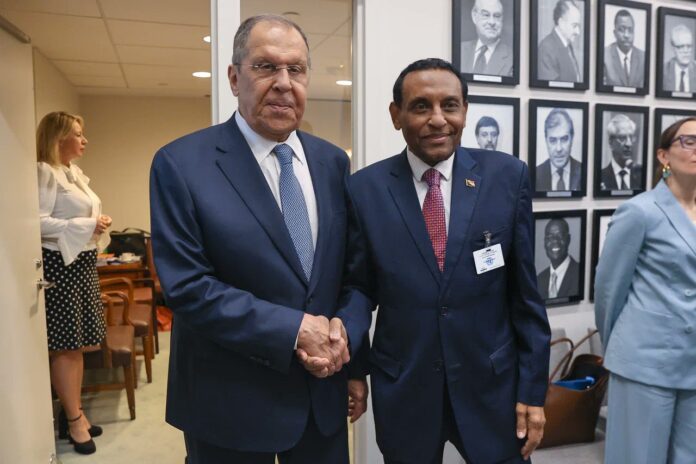In a move that signals a renewed embrace of Moscow, the Port Sudan-based authority signed a comprehensive cooperation agreement with Russia aimed at modernizing Sudan’s transport infrastructure. The deal spans the development of railways, ports, airports, and civil aviation, while also broadening collaboration in trade, finance, and training programs for the Central Bank of Sudan.
The agreement reflects Russia’s growing ambitions to bolster its footprint on the African continent, a strategy that international economic experts view as part of Moscow’s bid to position itself as an alternative to Western powers, particularly in the increasingly vital Horn of Africa region. Observers suggest that Sudan represents both an economic gateway and a strategic anchor for Russia, with the new partnership potentially extending into energy projects, mining concessions, military cooperation, and financial linkages across Africa.
Russian officials framed the deal as part of a broader diplomatic and economic push to deepen Moscow’s ties with Africa, asserting that Russian support could help Sudan rebuild its essential sectors and restore disrupted trade routes weakened by civil conflict. For Sudanese authorities, the agreement was welcomed as an economic lifeline. Officials described it as a critical step toward revitalizing national development efforts, reviving civil aviation, and reestablishing Sudan as a regional hub for transport and logistics.
A History of Russian Involvement in Sudan
Russia’s role in Sudan is neither new nor surprising. In 2017, the Kremlin-linked Wagner Group began supporting former Sudanese President Omar al-Bashir, an alliance that survived until Bashir’s ouster in 2019. Even after his fall, Wagner maintained operations in Sudan, including backing the 2021 coup that opened the way for a government seeking closer alignment with Moscow.
Since the outbreak of Sudan’s civil war in April 2023, reports have pointed to Wagner’s alleged military and logistical support for the Rapid Support Forces (RSF), led by Mohamed Hamdan Dagalo (Hemetti). While Wagner has denied direct involvement, Western governments expressed alarm over indications of training and weapons supplies, warning that this support risked further escalation of the conflict.
One of Russia’s most entrenched interests in Sudan remains gold mining. Wagner-linked company “Meroe Gold” has managed mining and smuggling operations, enabling Moscow to funnel Sudanese gold into its reserves. These flows have been vital for Russia’s efforts to bypass international sanctions imposed after its invasion of Ukraine, while simultaneously financing Wagner’s activities globally.
Gold, Guns, and the Red Sea Base
Alongside economic ventures, Russia has pursued a geostrategic foothold in Sudan. In December of last year, Bloomberg reported—citing Sudanese intelligence sources and Western officials—that Moscow and Sudan’s army were engaged in negotiations over establishing a Russian naval base in Port Sudan.
An existing agreement permits the construction of a Russian logistics facility on Sudan’s Red Sea coast, equipped to carry out maintenance and resupply operations for its naval fleet. The facility is designed to host up to 300 personnel and accommodate four warships simultaneously. However, this prospect has raised significant backlash from the United States and European partners, who see it as a direct threat to international security and maritime stability in the region.
Sudan’s role as a major gold producer adds a further layer to Moscow’s strategic calculus. Smuggled gold bound for Russia not only cushions Moscow against sanctions but helps stabilize its economy amid the costly war in Ukraine. In turn, the Sudanese military, constrained by Western sanctions and a conflict that has crippled its domestic defense industries, is increasingly reliant on Moscow to supply arms, ammunition, and maintenance.
Military Dependence and Strategic Necessity
Sudan has historically been one of Russia’s largest arms clients, ranking as its second-largest weapons buyer since 2000. Because of decades of American and Western embargoes, the Sudanese military remains deeply dependent on Russian and Eastern-standard ammunition, with its entire arsenal—particularly its air force—built upon cooperation with Russia, China, and to some extent, Ukraine.
For Khartoum, the prolongation of its internal conflict has forced the army to seek external lifelines to maintain supplies of food, weapons, and spare parts, particularly after RSF attacks damaged its domestic defense production. Russia stands almost uniquely positioned to fulfill these requirements, given its longstanding military ties, industrial capacity, and its own geopolitical priority of expanding in Africa.
For Moscow, Sudan’s strategic location is invaluable. Situated at the crossroads of the Horn of Africa, the Red Sea, and the Sahel, Sudan offers a gateway not only to vital maritime routes but also to the contested heartlands of Central Africa. The Stockholm International Peace Research Institute has documented that nearly 49 percent of Africa’s military imports between 2015 and 2019 came from Russia, with Sudan serving as a launchpad for Russian penetration into Central African Republic, Niger, and beyond.
A Mutual Calculus
This renewed partnership is therefore more than a transactional deal—it is a convergence of necessity and ambition. For Sudan, crippled by civil war, international isolation, and economic collapse, Russian backing offers immediate relief and the prospect of rebuilding shattered infrastructure. For Russia, investing in Sudan bolsters its African foothold, strengthens gold-fueled sanction evasion, secures military leverage, and asserts itself as a global power alternative to the West.
The question now is whether this alliance will deliver stability and development for Sudanese citizens—or instead entrench the country as another theater in Moscow’s wider strategic contest with the West.


